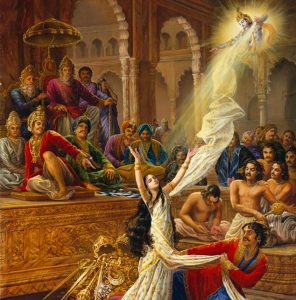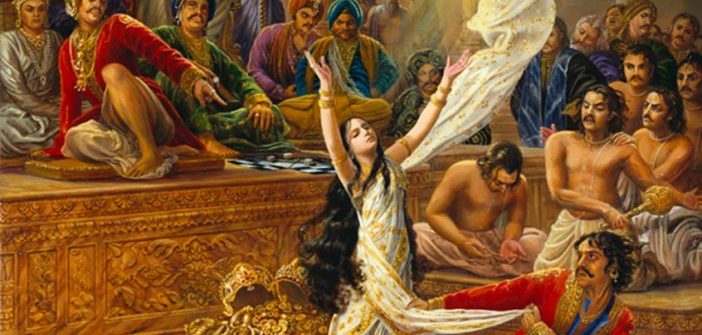Neutrality has two distinct features. First, it is often meant to not take any sides in a conflict and second, expected to make judgments independent of any bias. When someone is looking for endorsement, approval for his or her behavior or protection, the former neutrality is despised! Someone famously commented, “The hottest places in hell are reserved for those who in times of great moral crisis maintain their neutrality!”
When India was overrun by invaders, the unaffected people refused to stand up and fight for the oppressed fellow human beings. Since they were not being attacked, their logic was ‘why create enmity’. This foolish logic of being ‘the neutral party’ suited the invaders who killed, both, their enemies and ‘the neutral party’! Be it modern, medieval or Vedic society, history is replete with examples of neutrality being the cause of a greater violence.
Victim of Neutrality
Bhishma, the Kuru grandsire, was always neutral towards his grandchildren (Pandavas and Kauravas), but invariably ended up supporting the evil Kauravas. To cite two instances:
- Duryodhana had attempted to burn the Pandavas, who eventually escaped with the help of Vidura. When they returned to claim their rightful position, Duryodhana had already been installed as the Prince of Hastinapura. Should Duryodhan be asked to step down and hand over the kingdom back to Yudhishthira or let him continue, was the dilemma facing Bhishma. Rather than punishing Duryodhana for attempting to murder the Pandavas, Bhishma took the easy way out and carved the kingdom into two!
- This same neutrality prevented Bhishma from protesting when the Kauravas attempted to disrobe Draupadi in the royal court. The attitude of the grandsire encouraged the Kauravas to behave arrogantly and viciously. Bhishma maintained neutrality at the cost of dharma and justice and this culminated in him fighting alongside the wrongdoers, Kauravas, in the battle of Kurukshetra.

Krishna’s dealing with Neutrality
Balarama, Krishna’s brother was another prominent figure who ‘resolved to be neutral’ at a crucial juncture in life. His sympathies lay with Duryodhana so he decided to remain neutral and set out on a pilgrimage before the battle. He returned on the last day of the battle and witnessed the fight between Bhima and Duryodhana – a fight that would decide their own fate and the future of Hastinapura. When Bhima struck Duryodhana below the belt, apparently breaking one of the rules of mace fighting, Krishna prevented Balarama from striking Bhima, by reminding him of his ‘resolve to be neutral’. Here too, Balarama’s neutrality almost supported the wrongdoer!
Even though he decided not to take up arms during the battle, Krishna was never neutral – he sided with dharma, represented by the Pandavas. He knew, being neutral in situations of injustice, is taking sides of the oppressor.
Life challenges each one of us to take a stand in life. Being indecisive or (even worse) ambiguous never helped anyone, because situations ultimately force one to take a stand. It would be in our best interest to be guided by dharma when making decisions. Wouldn’t you rather be Abhimanyu who perished attempting to uphold dharma rather than Bhishma who also perished, but supporting the wrong people/cause or worse yet perish because you did not take a stand and preferred to stay neutral at all costs?



5 Comments
What an amazing insight. This is brilliant article. Thank you
Wonderful…
Can you share some practical tips on how to take stand on the side of dharma? Being an individual with no influence and strength, what possible a single insignificant soul like me could change anything in favor of dharma?
Dharmo Rakshati Rakshitah…
In this context of this article, I remember a stanza from the poem ‘Kurukshetra’ by Ramdhari Singh Dinkar. समर शेष है नहीं पाप का भागी केवल व्याघ्र, जो तटस्थ हैं समय लिखेगा उनके भी अपराध ।